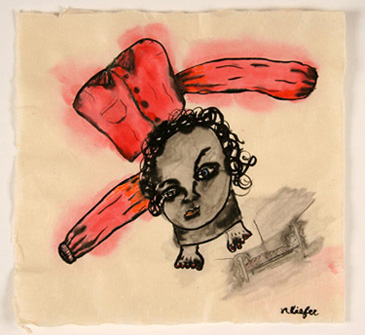
TARPAULIN SKY
Spring/Summer 07

JOANNA HOWARD
Captive Girl
for Cobbled Horsemen
From the ditch below the family graves, where she huddled softly in the shadow of a stone, the small child was taken up into a new community. A transition toward different civility followed roughly across several years: a new weave of fabric, daughter or wife, a vengeful scar across the right cheek of her captor, thread made from sinews, ever so many dogs crossing and recrossing the mobile compound and surveying the parameters.
And of those left behind her? On a deathbed, the last fading matriarch cobbles a makeshift family from extensions and tatters: a wild boy pulled from the cactus, a deserter cavalry man riding trick on some horses, and the fugitive uncle suspected of murder. These are the riches on earth left to a little girl kept captive in one compound, far from the safety of another compound, and far from that last passageway before death! And so the search continues, at the hands of a new collective.
Some dark time passes, and the girl removed, continues removed, remiss. Her garments turn up for trade. A new head of hair comes on to her in curls. There is little sleep in the compound, for the baying dogs, for the scouts left edging along the pickets, for the girl sharing only so much of a corner with several other girls. Exhaustion builds, sockets darken and sink, so much of her face grows beyond her child’s mouth. They move on together, nomadic, and self-sufficient. In the distance, some vague pursuant.
On the edge of the river and the border between countries, a ranch, sprung up rather from the dust of nothing, stands idle and anticipating. It is a stationary compound, shaped, after a given time, according to the times, for a family who welcomed the hardship of hard ground, where the high plains surrounded smokily, red and exposed. Four structures briefly crenellate the horizon: a cylindrical water tower rising above a deep round of troughs, a crisp white farm house edging onto the corrals, the barn, the maid’s quarters.
In this abandoned farm house, in the shadowed corner of a pale room, a bed awaits the returning girl, who polished and hushed of fears, might take up where things were left off. But how were they left off, and who is left to take up? As the years pass, quite quickly in fact, she floats apart from the dream of the bed, and the memory of someone stooped gently above it. There had only been one brother after the war, and then, somehow, another campaign followed. Are any brothers left? Any mothers?
In their travels, the red dirt becomes sand, and the sand gives way to salt, and the west drifts blankly, and blindingly, before them. Another camp built and picketed at the foot of the mountains.
Over the camp fire two men begin a transaction, but a satisfactory agreement cannot be struck. He catches her in the corner of his eye, passing obliquely between dogs. Much later, as he leaves their compound, two scouts polish their weapons, but are not seen again. Several days pass, without event, in the sweltering white.
On evenings, she wanders in the hills to search for clay mud to carry back in the flat of a basket. In a white cave, with water slipping along the lime, she discovers the torn sleeve of a man’s shirt. She recognizes the fabric, blood-soaked and home spun, and she tucks it up into her dress, to be fit later, quite naturally into an emerging puzzle.
From here she descends, and so the two parties meet finally just below the shelf of the mountain. Down in the white valley, the skirmishes have already begun, along a thin bed of water, cupped in the curve of the drifting flat. Even here, salt infects the pool. Now the pursuer takes lead, on horse back, at the head of the procession, a narrow line obscured in the rising dust. In the distance at high gallop, the cavalry man rides standing up across two horses. The boy from the cactus grown now to the height of a great, dark man slips barefoot from his saddleless horse, toward her, imploring, she imagines, to slit her throat. And so begins her roughshod removal.
But what grand cobblings await her! His broad back, his horseman’s hands, his slow drawl, his grim stagger, his soft step, his dark eyes, the white arm soon to be removed, grinning blackly below the torn seam of the shoulder: Oh my uncles, my brothers, fresh from memory come to take me home.
Severed and refitted, she now begins the flight to this strange future from this imagined past.
Joanna Howard�s work has appeared in Conjunctions, Chicago Review, Unsaid, Quarterly West, Fourteen Hills, Western Humanities Review, Salt Hill, and elsewhere. Her chapbook, In the Colorless Round, with artwork by Riki Ducornet, is available from Noemi Press. She lives in Providence, RI where she edits for The Encyclopedia Project, and teaches part-time at Brown.